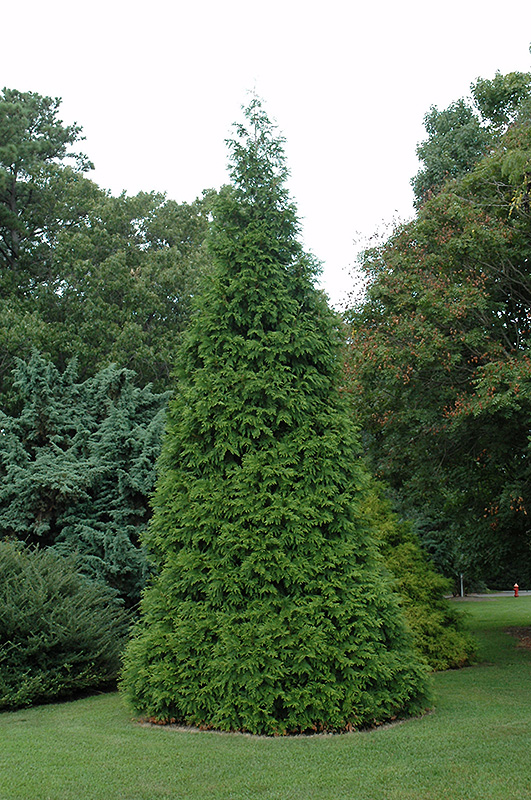Plant Finder
Green Giant Arborvitae
Thuja 'Green Giant'
Height: 30 feet
Spread: 10 feet
Sunlight:
![]()
![]()
Hardiness Zone: 4b
Other Names: Green Giant Cedar
Description:
A stately looking upright evergreen that grows uniformly and is perfect for privacy or wind screening; very resilient and resists ice and snow damage, grows in almost any soil type
As Seen at The Morton Arboretum
These woody plants are found at The Morton Arboretum in their commonly visited spaces including the Visitor Center, Meadow Lake, and Children's Garden. They have proved to be hardy, beautiful, long-lived plants that easily fit into the home landscape.
Ornamental Features
Green Giant Arborvitae is primarily valued in the landscape for its distinctively pyramidal habit of growth. It has rich green evergreen foliage. The scale-like sprays of foliage remain green throughout the winter. The shaggy brown bark adds an interesting dimension to the landscape.
Landscape Attributes
Green Giant Arborvitae is a dense multi-stemmed evergreen tree with a distinctive and refined pyramidal form. Its relatively fine texture sets it apart from other landscape plants with less refined foliage.
This is a relatively low maintenance tree. When pruning is necessary, it is recommended to only trim back the new growth of the current season, other than to remove any dieback. It has no significant negative characteristics.
Green Giant Arborvitae is recommended for the following landscape applications;
- Vertical Accent
- Hedges/Screening
Planting & Growing
Green Giant Arborvitae will grow to be about 30 feet tall at maturity, with a spread of 10 feet. It has a low canopy, and should not be planted underneath power lines. It grows at a fast rate, and under ideal conditions can be expected to live for 50 years or more.
This tree does best in full sun to partial shade. It prefers to grow in average to moist conditions, and shouldn't be allowed to dry out. It is not particular as to soil type or pH. It is somewhat tolerant of urban pollution, and will benefit from being planted in a relatively sheltered location. Consider applying a thick mulch around the root zone in winter to protect it in exposed locations or colder microclimates. This particular variety is an interspecific hybrid.
This Plant Finder tool is an online catalog representing many of the varieties that we carry over the course of the season, and is intended for informational purposes only. Inventory varies seasonally, so we cannot guarantee that every plant will be in stock at all times - please contact the store for current availability. It does not include our entire inventory of plants, so be sure to visit us to see varieties that may not be represented on this list.

